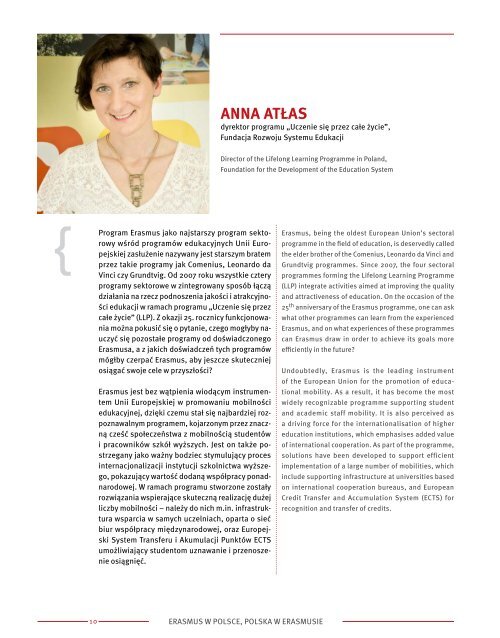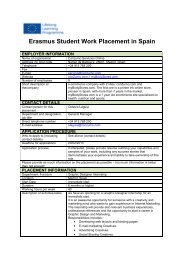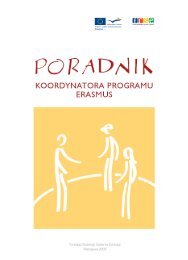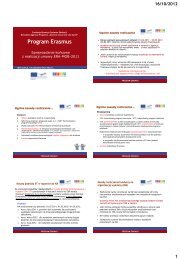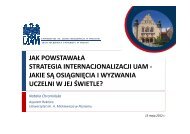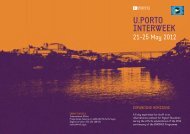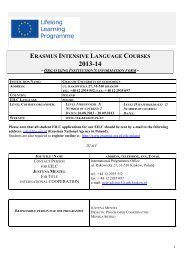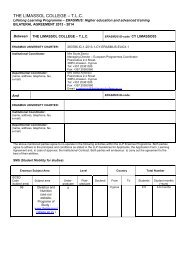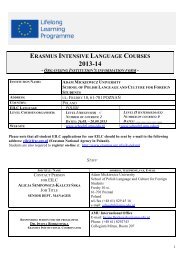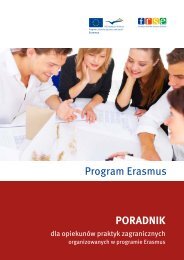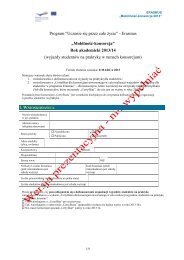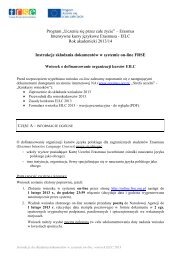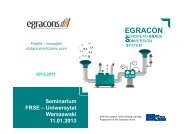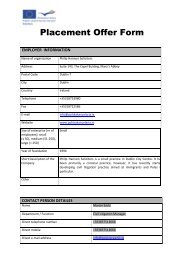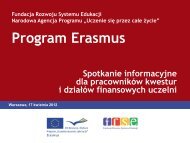Erasmus w Polsce, Polska w Erasmusie. Publikacja wydana z okazji ...
Erasmus w Polsce, Polska w Erasmusie. Publikacja wydana z okazji ...
Erasmus w Polsce, Polska w Erasmusie. Publikacja wydana z okazji ...
Create successful ePaper yourself
Turn your PDF publications into a flip-book with our unique Google optimized e-Paper software.
Anna Atłas<br />
dyrektor programu „Uczenie się przez całe życie”,<br />
Fundacja Rozwoju Systemu Edukacji<br />
Director of the Lifelong Learning Programme in Poland,<br />
Foundation for the Development of the Education System<br />
{<br />
Program <strong>Erasmus</strong> jako najstarszy program sektorowy<br />
wśród programów edukacyjnych Unii Europejskiej<br />
zasłużenie nazywany jest starszym bratem<br />
przez takie programy jak Comenius, Leonardo da<br />
Vinci czy Grundtvig. Od 2007 roku wszystkie cztery<br />
programy sektorowe w zintegrowany sposób łączą<br />
działania na rzecz podnoszenia jakości i atrakcyjności<br />
edukacji w ramach programu „Uczenie się przez<br />
całe życie” (LLP). Z <strong>okazji</strong> 25. rocznicy funkcjonowania<br />
można pokusić się o pytanie, czego mogłyby nauczyć<br />
się pozostałe programy od doświadczonego<br />
<strong>Erasmus</strong>a, a z jakich doświadczeń tych programów<br />
mógłby czerpać <strong>Erasmus</strong>, aby jeszcze skuteczniej<br />
osiągać swoje cele w przyszłości?<br />
<strong>Erasmus</strong> jest bez wątpienia wiodącym instrumentem<br />
Unii Europejskiej w promowaniu mobilności<br />
edukacyjnej, dzięki czemu stał się najbardziej rozpoznawalnym<br />
programem, kojarzonym przez znaczną<br />
cześć społeczeństwa z mobilnością studentów<br />
i pracowników szkół wyższych. Jest on także postrzegany<br />
jako ważny bodziec stymulujący proces<br />
internacjonalizacji instytucji szkolnictwa wyższego,<br />
pokazujący wartość dodaną współpracy ponadnarodowej.<br />
W ramach programu stworzone zostały<br />
rozwiązania wspierające skuteczną realizację dużej<br />
liczby mobilności – należy do nich m.in. infrastruktura<br />
wsparcia w samych uczelniach, oparta o sieć<br />
biur współpracy międzynarodowej, oraz Europejski<br />
System Transferu i Akumulacji Punktów ECTS<br />
umożliwiający studentom uznawanie i przenoszenie<br />
osiągnięć.<br />
<strong>Erasmus</strong>, being the oldest European Union’s sectoral<br />
programme in the field of education, is deservedly called<br />
the elder brother of the Comenius, Leonardo da Vinci and<br />
Grundtvig programmes. Since 2007, the four sectoral<br />
programmes forming the Lifelong Learning Programme<br />
(LLP) integrate activities aimed at improving the quality<br />
and attractiveness of education. On the occasion of the<br />
25 th anniversary of the <strong>Erasmus</strong> programme, one can ask<br />
what other programmes can learn from the experienced<br />
<strong>Erasmus</strong>, and on what experiences of these programmes<br />
can <strong>Erasmus</strong> draw in order to achieve its goals more<br />
efficiently in the future?<br />
Undoubtedly, <strong>Erasmus</strong> is the leading instrument<br />
of the European Union for the promotion of educational<br />
mobility. As a result, it has become the most<br />
widely recognizable programme supporting student<br />
and academic staff mobility. It is also perceived as<br />
a driving force for the internationalisation of higher<br />
education institutions, which emphasises added value<br />
of international cooperation. As part of the programme,<br />
solutions have been developed to support efficient<br />
implementation of a large number of mobilities, which<br />
include supporting infrastructure at universities based<br />
on international cooperation bureaus, and European<br />
Credit Transfer and Accumulation System (ECTS) for<br />
recognition and transfer of credits.<br />
10<br />
<strong>Erasmus</strong> w <strong>Polsce</strong>, <strong>Polska</strong> w <strong>Erasmus</strong>ie


